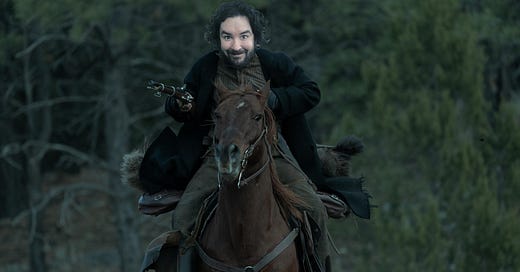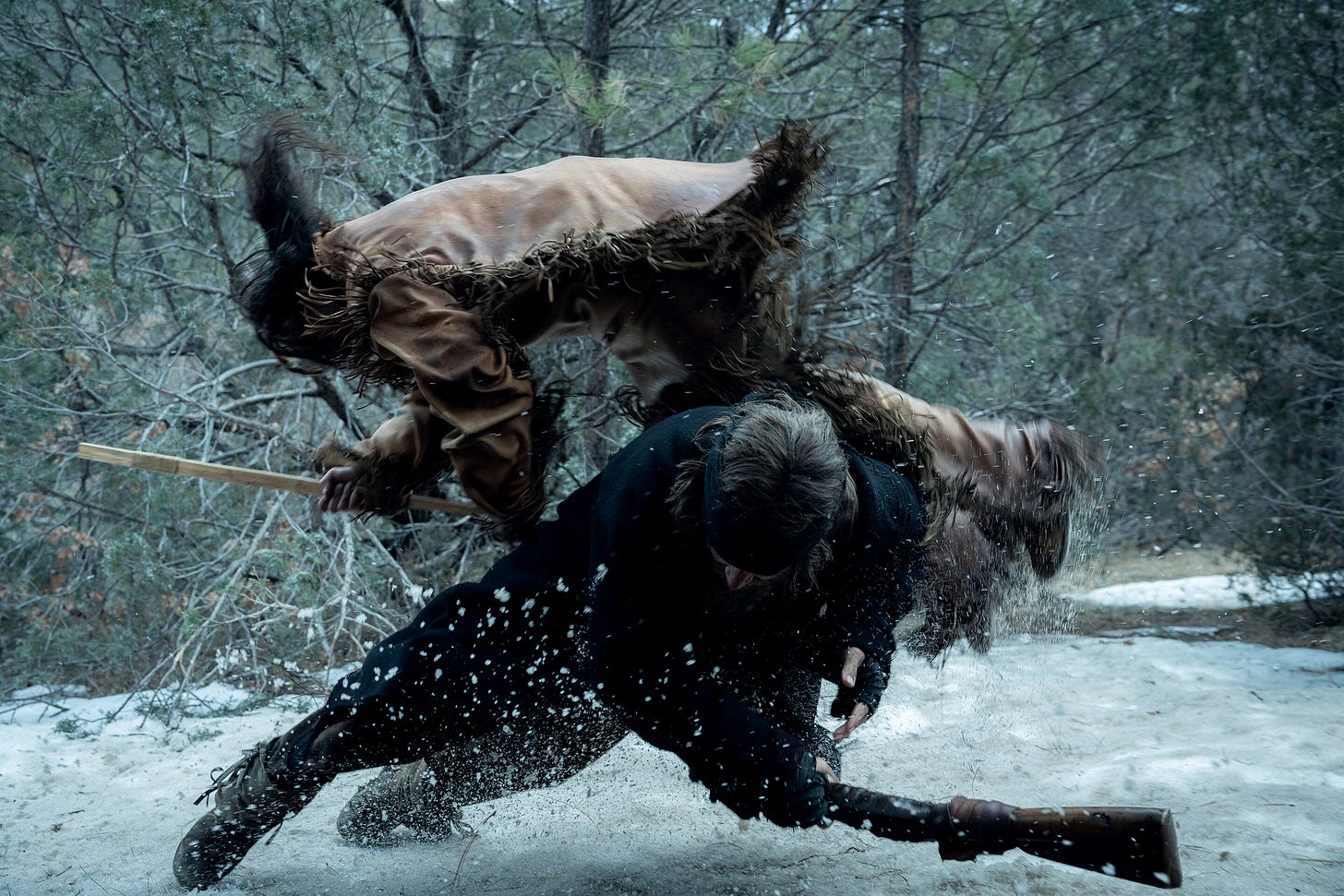They say that Blood Meridian is unadaptable, that Cormac McCarthy’s epic Western novel is too violent to faithfully render on screen. Filmmakers continue to try to make it happen, though. John Hillcoat is working on an adaptation. There have been so many aborted attempts that I’ll believe it when I see it. I don’t think Blood Meridian is truly unadaptable, though, it just would be very different from the novel in a way some people wouldn’t like. A film wouldn’t be able to capture the experience of reading McCarthy’s prose, and the violence would have to be toned down a little. But it’s possible to make an extremely violent Western. Director Peter Berg (Friday Night Lights) and screenwriter Mark L. Smith (The Revenant) just did it with American Primeval, a limited series now out on Netflix.
American Primeval follows a bunch of people as they try to survive on the Utah frontier in 1857. It’s pretty standard Western stuff about settlers vs. Native Americans, nature, and each other. The most interesting part of the story is the attention it pays to Mormon settlers, who are an important part of the story of the founding of the American West but don’t often get included in mainstream narratives.
But American Primeval isn’t really about the story, it’s about the style. American Primeval reunites Berg with Friday Night Lights star Taylor Kitsch and composer Explosions in the Sky. Berg also reunites with FNL’s roaming handheld camera. It’s pretty cool to see that distinctive style of cinematography used in this context. He shoots fight scenes like Friday Night Lights football games, replete with hard hits that would make a SportsCenter highlight reel.
He also color-corrects it to an extremely desaturated, blue-gray shade that almost makes it look sepia-toned. It makes people so pale they look dead. Bright colors must hurt Berg’s eyes, he’s so averse to them.
In addition to Kitsch as the requisite hardened gunslinger who rediscovers his humanity, the ensemble cast is led by Betty Gilpin. Gilpin is a terrific actress who I’ve enjoyed watching in 20th century period pieces GLOW and Gaslit, but there’s something off about her performance here. Her voice sounds modern. It’s like she has the vocal equivalent of iPhone face. It’s hard to describe, but it’s something about how she doesn’t attempt an old-timey accent. She speaks in a quiet, casual voice that doesn’t carry across the plains and mountains. You’ll know it when you hear it.
You know who really seems like he belongs in the 19th century, though? Dane DeHaan. My guy from The Place Beyond the Pines has aged into having an old babyface. He’s almost 40, but he looks like a 22-year-old who’s having a hard life. He’s physically and temperamentally perfect for the role of a Mormon guy on the verge of religious mania trying to find his kidnapped wife while he recovers from being partially scalped. That’s the kind of gruesome violence you’re in for.
The cast also includes Dad Show icon Shea Whigham. The presence of Shea Whigham is a good barometer of quality. If the Whig Master is in something, even if it’s not great, it won’t be too bad. Since he broke out on Boardwalk Empire, the only truly terrible thing he’s been in is The Gray Man, which isn’t even a real movie. The rule holds for American Primeval, which isn’t amazing, but is well-made, engaging, and stylistically different enough from other spins on this traditional Western story that it’s definitely worth watching if you’re into this sort of thing.
For my first TV Guide review of 2025, I wrote about Prime Video’s On Call and Max’s The Pitt, the first true streaming procedurals which both happened to premiere today, and what they mean for the future of television.
The commonalities between On Call and The Pitt could show the form of an emergent streaming procedural taking shape. If these two shows are setting a trend, streaming procedurals will have familiar plotlines and characters, but will take advantage of streaming's lack of restriction on graphic content. They'll be gorier and have more swear words, and they'll feel more grounded and realistic because of it. They'll engage with America's pressing crises of homelessness, mental illness, and drug addiction — and inspire you to keep Narcan on hand, because you might need it to save someone's life — but in a way that mostly avoids explicit political stances. (On Call has an old school sergeant played by ER alum Eriq La Salle complain that "everyone's so woke they don't want to put sh--heads in jail," while The Pitt has a young doctor played by Supriya Ganesh fight against racial disparities in healthcare, but neither show prioritizes these ideas.) They'll teach you the latest cop and medical jargon and show off the latest technology. They'll move at a pace fast enough to keep a viewer whose brain has been rotted by TikTok engaged. And they'll keep a tight focus on the workplace, deemphasizing the characters' lives off the job. Unlike most contemporary procedurals, On Call and The Pitt don't follow their characters home.








This is what I needed to hear!
I want to like this, and I'm still trying to decide if I do or not. I'm to the final episode. Very gritty show which I enjoy that aspect. It has opened my interest into the historic Utah War, something I knew nothing of. They sure didn't go easy on the Mormons with this series that's for sure. Something is off though with the series and I'm not quite sure what that is keeping me from saying "it's must watch".